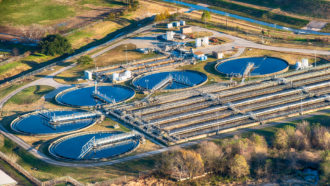San Francisco Airport to Track Aircraft Waste for COVID-19 Variants

International travelers can now assist in COVID-19 surveillance efforts in the United States by contributing valuable data from airplane wastewater.
San Francisco International Airport announced on May 9 the launch of a new program to continuously test airplane wastewater for variants of SARS-CoV-2, the virus responsible for COVID-19. This is the first program in the country to monitor sewage from airplanes, after previous studies have shown its potential value.
Experts consider airplane wastewater a crucial source for COVID-19 surveillance because international travelers often bring new variants into the country. As fewer people undergo nose swab tests in healthcare facilities, the U.S. Centers for Disease Control and Prevention is seeking new methods to keep track of coronavirus mutations. Examining genetic material from airplane bathroom waste can help fill the data gap and offer early warnings for future health crises.
Alexandria Boehm, an environmental engineer at Stanford University who leads WastewaterSCAN, one of the most extensive wastewater surveillance programs in the United States, stated that testing airplane waste "can provide us with a sense of which variants are being imported and help us prepare."
For this new project, the San Francisco airport is collaborating with the CDC and Concentric by Ginkgo, a biosecurity and public health team in Boston.
According to a spokesperson for the airport, testing began on April 20. Airport workers collect samples from vacuum trucks that extract waste from airplane bathrooms using an automated machine that connects to a central dumping point. "We're creating a composite sample of the trucks, which themselves are a composite sample of aircraft," explains Andrew Franklin, director of business development at Concentric.
The San Francisco airport has one dumping point dedicated to international flights, which are a priority for testing because passengers are more likely to use the restroom and provide solid samples when they spend many hours on the plane. The airport is sending one composite sample per day, six days per week, to a laboratory, where scientists isolate the coronavirus' genetic material and run the results through machines that map the virus' genes.
However, the resulting data are complex, as each sample includes hundreds of passengers from all over the world. Concentric's Director of Bioinformatics, Casandra Philipson, says that "trying to determine actual frequencies of mutations or variants" in the sewage samples will be a challenge, but simply seeing certain variants appear in the data will alert health officials to what to lookout for.
Concentric has collaborated with the CDC since fall 2021 to monitor COVID-19 among international travelers and began offering free PCR tests to people returning from long flights. About 170,000 travelers have participated in the program, which has identified new variants before they spread widely in the United States.
Wastewater surveillance is more efficient than voluntary nose swabs, and scientists are considering this approach for future monitoring efforts. In August and September 2022, Concentric and CDC researchers tested the concept in a pilot program at John F. Kennedy International Airport in New York City. Out of 88 samples collected from airplane bathrooms, the team performed PCR tests on 80, and 65 of those tested positive for SARS-CoV-2. The scientists reported in the Feb. 24 Morbidity and Mortality Weekly Report that genetic material analysis from 25 samples revealed a range of coronavirus variants.
Other research projects and pilot programs have demonstrated this technique's potential for identifying variants. The European Commission has issued guidelines for airports in the European Union that wish to conduct testing. However, scientists are still figuring out how they may interpret and act on the data, similar to other types of wastewater surveillance. Boehm says, "It will be a new data stream that we'll have to learn to use as it evolves."
Scientists hope that, in addition to tracking coronavirus variants, future programs like the one at the San Francisco airport can establish the framework for monitoring new diseases that could enter the United States via international airports. Colleen Naughton, an environmental engineer at the University of California, Merced, says that "it's easy to test the samples for other emerging pathogens."
The Concentric team is excited about this potential and looking for other types of health data that might come out of airplane waste. “We’re building this future technology,” Philipson says, “to expand the toolkit for pathogens of public health concern.”




